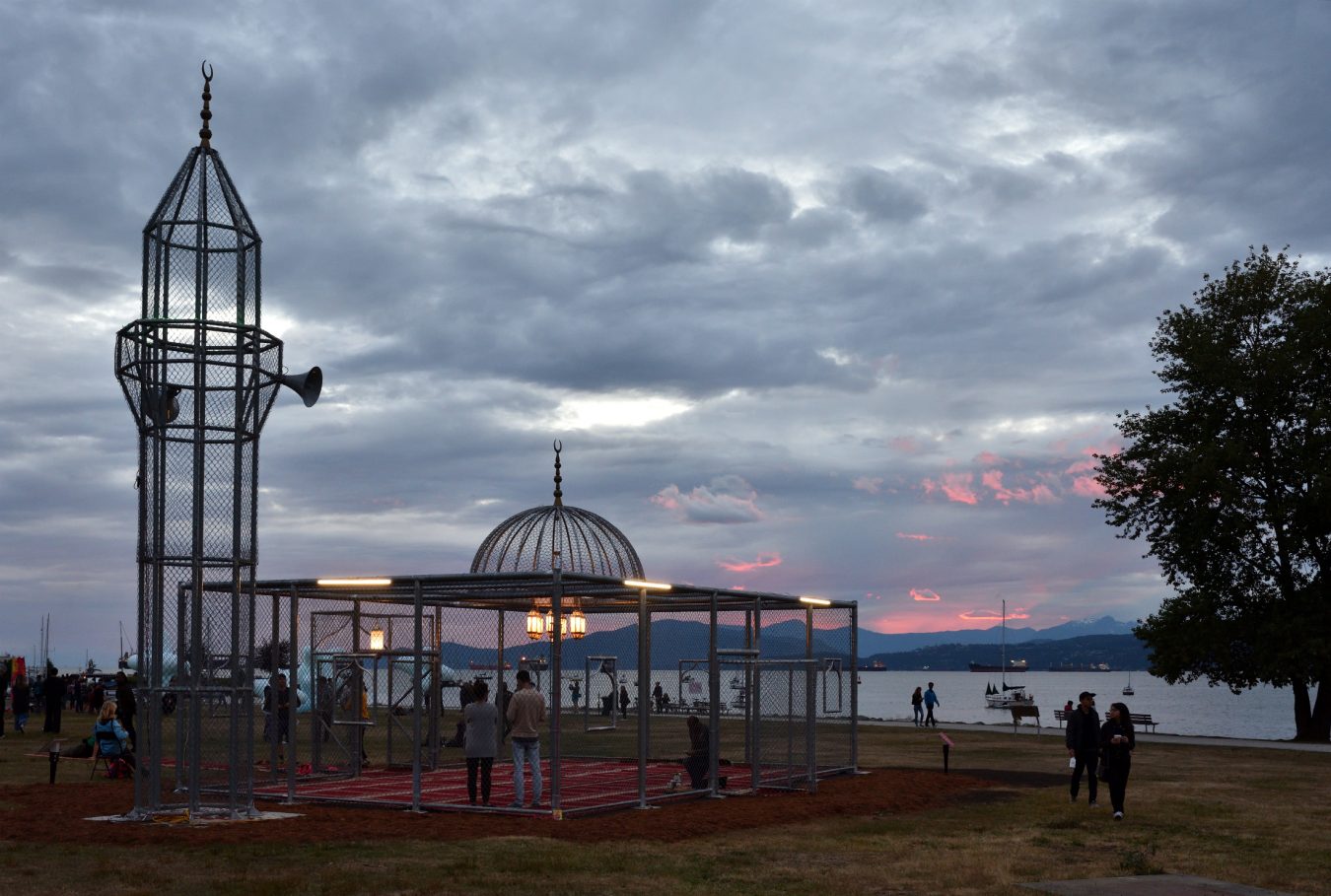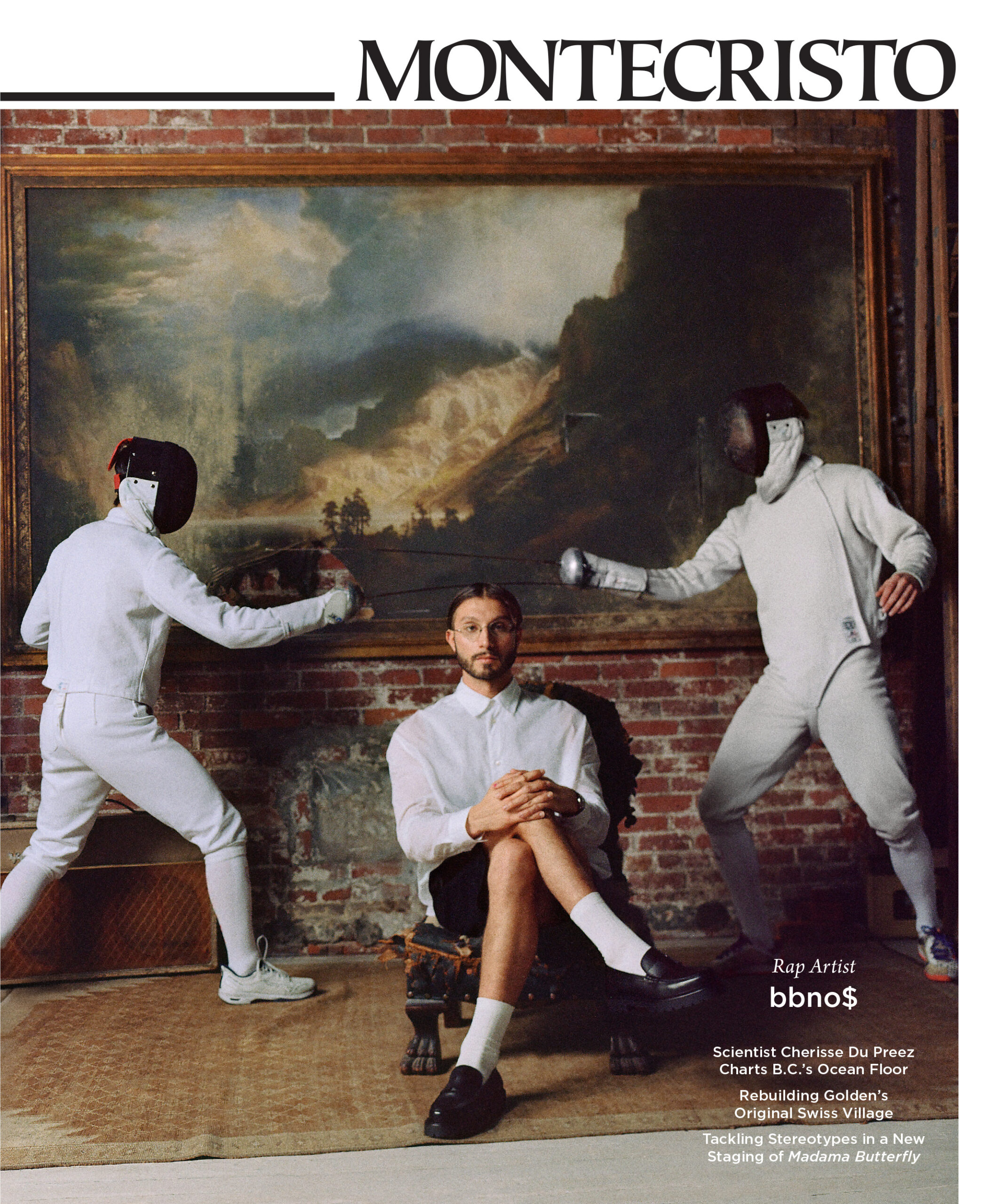In 2015, Ajlan Gharem drove an hour away from the city of Riyadh and into the vast Saudi Arabian desert. As a setting pink sun washed over the windswept sand, assembly on his latest art piece began: chain-link fences went up one by one, a golden plexiglass chandelier was hung, and a crimson red carpet was gently rolled out. Throughout the process, there wasn’t another soul in sight. “That’s why I chose the desert: the emptiness,” the multidisciplinary artist says. “There’s nothing there.” Until he created Paradise Has Many Gates, that is. Among the endless grit and powder of the desert, a sacred place emerged: a mosque.
After capturing a few images and videos of the final piece, he took the installation down. “It doesn’t stay there for long,” Gharem admits. “You’re afraid of the reaction.” That is the risk of being a contemporary artist in Saudi Arabia. But the story of Paradise Has Many Gates does not end there—in fact, its journey has taken it all the way to the Canadian West Coast for the Vancouver Biennale.
Far removed from the golden sand of his home, Gharem now stands on wet grass at Vanier Park, raindrops brushing his face and the smell of the nearby oceanfront filling his nose. “It’s very different,” he says, laughing. Bikers, dog walkers, and joggers cruise by, each curiously slowing down to take in the large piece of public art that sits on the grass. With the visual transparency of its chain-link walls and ceiling, Paradise Has Many Gates reflects on the contrast between faith and modernity. By erecting the structure in the form of a mosque, Gharem questions the role of religion in society, all while encouraging viewers of all faiths to imagine a space free from Islamophobia.
The idea embodies the Biennale’s present theme “re-IMAGE-n,” which asks participants to reconsider their perceptions and understandings of current issues both at home and abroad. With a news cycle that is working rapidly to report stories about mass migration, refugee crises, and travel bans targeted at several Muslim-majority countries, Paradise Has Many Gates, particularly with its materials, evokes feelings of detention and unrest. At the same time, the piece is undeniably beautiful.
Barrie Mowatt, president and artistic director of the Vancouver Biennale, admits he was concerned about the controversy that could come from such a provocative piece. But so far, the response to Gharem’s work has been positive. “I call this the elephant in the room,” Mowatt says of the installation, which is the first launch of the Biennale’s 2018 to 2020 citywide public art festival. “You can’t pretend this isn’t here.” Mowatt first saw Paradise Has Many Gates when it was on display at the Station Museum of Contemporary Art in Houston as part of an exhibition on Saudi Arabian works. He believes that having it in Vancouver challenges our own approaches to tolerance right here at home. “This really is a statement about Canada. Are we a nation that can really engage and accept multiculturalism?” says Mowatt. “Can we really accept our differences? Are we truly who we think we are?”
In 2013, Gharem founded Gharem Studio alongside his brother and fellow artist, Abdulnasser Gharem. Its purpose is to cultivate and nurture organic growth in the Saudi Arabian art community, giving artists a chance to do what they love in a safe space. Although the art scene isn’t fully established in Saudi Arabia, the Gharem brothers are helping foster local talent, allowing pieces like Paradise Has Many Gates to be recognized worldwide. “It’s important to create the artist, to let them know what’s going on in the art scene around the world, to see the other experience of the other artists,” he says. Still, Gharem is only a working artist come evening; by day, he is an elementary school math teacher. “We have daytime jobs and, in the night, we go to the studio,” he explains. “In Saudi, you need to have a job. You have to be within the society, you have to be in-between them. You can’t be the artist, separated.”
The interpretation of Paradise Has Many Gates was both profound and challenged in Gharem’s native country. Although the installation has never been shown in Saudi Arabia (aside from those mere moments when it was first built in the desert), images of it have gone viral, sparking anger from older generations and praise from the young. Gharem, who was born in 1985, notes that more than half of Saudi Arabia’s population is under 30, and that many are starting to question the more traditional outlooks of their elders. “Our generation,” he says, “has more knowledge than beliefs.”
Acting as a real mosque, Paradise Has Many Gates encourages visitors to take off their shoes and sit within its walls. Thinking back to an event that the installation hosted for Multiculturalism Day, Mowatt recalls a beautiful moment when a Muslim man began praying inside it at the end of the evening. “I was standing at the gate and we were going to shut the lights off and the man said, ‘This is such a beautiful experience, this is a dream come true,’” Mowatt remembers. “I never would have imagined that.” This is more than just a visual masterpiece—it’s a community builder, an eye-opener, a space for all.
Read more from the Arts.









